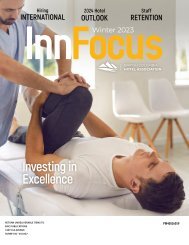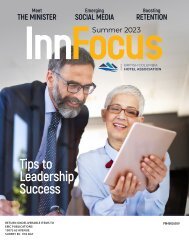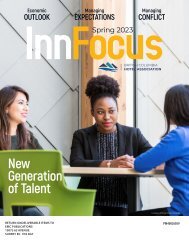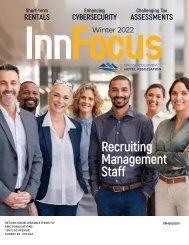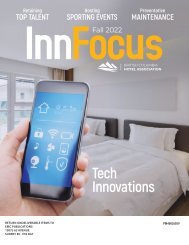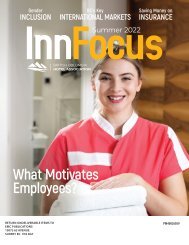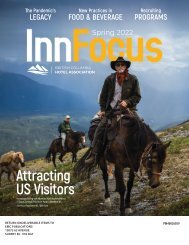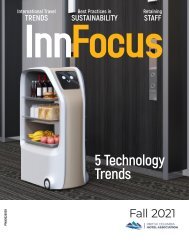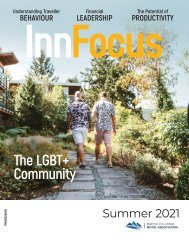InnFocus Spring 2021
InnFocus magazine for hoteliers in British Columbia
InnFocus magazine for hoteliers in British Columbia
Create successful ePaper yourself
Turn your PDF publications into a flip-book with our unique Google optimized e-Paper software.
Housekeeping<br />
BEST PRACTICES<br />
Creating a pool of<br />
NEW TALENT<br />
REINVENTION<br />
of the hotel<br />
Revenue<br />
Strategy<br />
<strong>Spring</strong> <strong>2021</strong>
contents<br />
200-948 Howe Street,<br />
Vancouver, BC V6Z 1N9<br />
T 604-681-7164 1-800-663-3153<br />
www.bcha.com<br />
@BCHotelAssociation<br />
@bchotelassoc<br />
@BCHotelAssociation<br />
bchotelassociation<br />
BCHA Team<br />
Ingrid Jarrett<br />
President & CEO<br />
Mike Macleod<br />
Director Member<br />
and Business Development<br />
Karissa Bourgeault<br />
Executive Assistant & Board Liaison<br />
Kelsey Millman<br />
Communications for BCHA<br />
(Beattie Tartan)<br />
Dylan Tomlin<br />
Energy Analyst<br />
Samantha Glennie<br />
Office Coordinator<br />
2020/<strong>2021</strong> Board of Directors<br />
Executive Committee<br />
Bryan Pilbeam – Chair, Delta Kamloops<br />
Jonas Melin – Vice Chair,<br />
Harbourfront Pinnacle Hotel, Vancouver<br />
John Kearns – Past Chair,<br />
Sheraton Vancouver Guildford Hotel<br />
David McQuinn – Treasurer, Coast Bastion<br />
David MacKenzie – Director,<br />
Pemberton Valley Lodge<br />
Stephen Roughley – Director,<br />
Marriott Victoria Inner Harbour<br />
Vivek Sharma – Director, Fairmont Hot <strong>Spring</strong>s<br />
Directors<br />
Doug Andrews, The Listel Hotel<br />
Brady Berushi, Best Western Plus, Revelstoke<br />
Ravinder Dhaliwal, Mundi Hotels<br />
Angie Eccleston, Prestige Hudson Bay Lodge<br />
Stewart Instance, Best Western Tin Wis Resort<br />
Scott Johnson, Holiday Inn Express Metrotown<br />
Brian Rohl, Coast Coal Harbour by APA<br />
Eleanor Ryan, Pomeroy Inn & Suites & Stonebridge<br />
Chris Watson, Best Western Plus Carlton Plaza<br />
Barry Zwueste, St. Eugene Golf Resort & Casino<br />
5<br />
10<br />
18<br />
22<br />
extras<br />
How to Formulate Your <strong>2021</strong> Revenue Strategy<br />
What you need to do to weather the change in demand<br />
Housekeeping Best Practices<br />
Balancing smaller budgets with the increased demand for cleanliness<br />
Create a Talented Pool of<br />
Motivated Emerging Professionals<br />
Incorporate work integrated learning into your hotel<br />
Reinvention of the Hotel<br />
The timing couldn’t be better for a new approach to business<br />
8 Attracting & Retaining Guests<br />
28 Target the Over 70s Demographic<br />
Regulars<br />
4 BC Hotel Association Report<br />
26 BC Hospitality Foundation<br />
13 What’s New?<br />
29 BCHA Member Engagement<br />
26 Names in the News<br />
14 Go Green: Conserve Water<br />
15 Leader of the Future: Tania Chiasson<br />
27 Hotelier Feature: Jesse Crockett of The Josie<br />
21 Trends & Insights: Canada Ranks 3rd on NBI<br />
PUBLICATIONS MAIL AGREEMENT<br />
NO. 40026059<br />
RETURN UNDELIVERABLE CANADIAN<br />
ADDRESSES TO CIRCULATION DEPT<br />
EMC PUBLICATIONS<br />
19073 63 AVENUE<br />
SURREY BC V3S 8G7<br />
email: info@emcmarketing.com<br />
Regional<br />
Feature<br />
16 Northern BC:<br />
Tapping into<br />
Natural Resources<br />
<strong>InnFocus</strong> is published quarterly<br />
by EMC Publications - a division<br />
of EMC Executive Marketing Consultants Inc.<br />
19073 63 Avenue, Surrey, BC, V3S 8G7<br />
t 604-574-4577 1-800-667-0955<br />
info@emcmarketing.com<br />
www.emcmarketing.com<br />
Publisher & Editor: Joyce Hayne<br />
Design & Layout: Kyla Getty<br />
<strong>InnFocus</strong> 3
y Ingrid Jarrett, President & CEO<br />
It has now been over a year since the first cases of COVID-19 were<br />
reported in Canada. At the time, COVID-19 was not a part of our lexicon<br />
yet as we referred to the emerging virus as the coronavirus. Knowledge<br />
of the coronavirus grew, and incidentally, sales of Corona beer were<br />
decimated; resulting in complete shutdowns of manufacturing plants<br />
across Mexico.<br />
This was the first significant fallout from the virus as it quickly spread<br />
across the globe, leaving devastation and fear in its wake—a reality that<br />
has become too familiar for our industry.<br />
But as the public was asked to stay at home, they dreamt of sipping<br />
a cold beverage on the sandy beaches they could no longer enjoy, and<br />
as a result, the sales of the Mexico-based beer once again grew, proving<br />
that resiliency and recovery are not out of reach.<br />
One year later, we are still facing devastating restrictions and travel<br />
shaming, along with limited science and pilot projects for proven<br />
mitigation strategies, such as rapid testing and contact tracing via<br />
technology in Canada. Our hospitality industry and our interconnected<br />
tourism industry are facing bankruptcies and insolvencies like never<br />
before. Facing <strong>2021</strong> with a lens from the learning from 2020 sets us up<br />
for recovery and resiliency in a completely different way than we knew<br />
previously.<br />
I can proudly say, the partnerships and collaboration that has been<br />
carried out to support one another has been a heart-warming experience,<br />
yet the outcomes such as low occupancy, layoffs, insolvencies, the<br />
financial burden of debt, and significant gaps in government support has<br />
resulted in a very heavy-hearted reality. General managers are acting as<br />
security guards, isolation hotels are misunderstood for the role they play<br />
as a safe harbour for citizens of Canada, and many hotels are repurposing<br />
their operations entirely, yet much of the measures for relief fall short of<br />
the needs of the accommodation sector.<br />
The advocacy work we are doing has moved some of the understanding<br />
federally. Certainly the CEWS and the HASCAP relief are literally saving<br />
hotels across the country from bankruptcy. Albeit the result is increased<br />
debt, it is at a manageable interest rate with a long repayment term.<br />
CEWS is the single most important relief measure, and we are advocating<br />
to continue that through to the fall or end of <strong>2021</strong>. Without CEWS, our<br />
labour force and treasured employees would no longer be connected<br />
to our industry, nor would we have employees currently working in our<br />
properties due to the lack of occupancy, rate, and demand.<br />
The sobering statistics of our January Pulse Check indicated that<br />
in urban centers occupancy is sitting at less than 15%. Winter resort<br />
destinations are suffering with occupancies between 20-30% due to<br />
government restrictions, while more rural areas are reporting occupancy<br />
of up to 30% occupancy. The key for our advocacy is to ensure that 2019<br />
remains the benchmark for year-over-year comparison both for CEWS,<br />
HASCAP, and all other relief programs. We are detailing the gaps in<br />
relief measures and strategically working with industry and association<br />
partners on strategies to reopen and recover. All research shows the<br />
pent-up demand that will follow this crisis will be significant, so we need<br />
to be ready for it, and this means ensuring our labour force is intact and<br />
ready to once again welcome the world to our outstanding properties.<br />
It is one year since my position as President & CEO was announced,<br />
and what a year it has been! I’d like to extend a warm thank you to all of<br />
you in the industry who have offered me support and encouragement,<br />
and a heartfelt thank you for those of you who have taken time to write<br />
to me with gratitude for the work we are doing on your behalf. You are<br />
the reason for our being—the reason we get up with new ideas and why<br />
we continue to fiercely stand up for what we need to survive and recover.<br />
This past year has been tough, it has been difficult, and it has been<br />
rewarding. Our focus on advocacy has never been more important. My<br />
commitment is that we continue to educate, communicate, and advocate,<br />
and that we are successful in all three commitments.<br />
4 <strong>InnFocus</strong>
How to<br />
Reformulate Your<br />
<strong>2021</strong> Revenue<br />
Strategy<br />
by Bonnie Buckhiester<br />
<strong>InnFocus</strong> 5
The financial crisis of 2008 affected many<br />
people in many different ways. One person<br />
was a man who built houses. In fact, he and<br />
his crew were the very best at what they did<br />
and because of that stellar reputation, they<br />
always had work. But when the crisis hit, the<br />
housing market crashed. And so, this man had<br />
to reinvent himself. And the very first thing he<br />
did was research what jobs were<br />
in demand. In what sectors was<br />
this demand? What educational<br />
background was required? What<br />
specific skillsets were needed? In<br />
the end, he went back to school.<br />
For a period, he went to school full<br />
time and because he was smart<br />
and good at whatever he tackled,<br />
he landed a full time job while still<br />
in school. In fact, there were times when he<br />
worked all night, went to school all day, and<br />
took naps in his car between work and school.<br />
Today he is a robotics engineer for BMW. Meet<br />
my brother Dan.<br />
So, what’s the moral of the story? Why,<br />
you may ask, am I relating this anecdote in an<br />
article about hospitality revenue management?<br />
Well, think about it. What did Dan do? First of<br />
all, he made sure he was “fishing” where the<br />
fish were. Second, he then characterized the<br />
demand and researched the nature of that<br />
demand. Where did it exist? Why did it exist?<br />
When did it exist? How long would it exist?<br />
And then he found out what it would take<br />
Those properties that could<br />
swiftly retool, reimagine, and<br />
reinvent would survive.<br />
to capitalize on that demand to his benefit.<br />
Sound familiar? This is what successful<br />
revenue management professionals have<br />
been doing to weather this unprecedented<br />
change in demand for hotel accommodation.<br />
We are told that 2020 was the worst year<br />
for the hotel business since the industry<br />
started keeping comparative-market<br />
statistical records. On January 21, <strong>2021</strong>,<br />
STR released their year-end 2020 data for<br />
Canada. Occupancy 33.1% (down 49.2%).<br />
Average Daily Rate $130.43 (down 21.0%).<br />
RevPAR $43.11 (down 59.8%). The highest<br />
occupancy performance among all provinces<br />
was British Columbia, at 39.4% (down 43.4%),<br />
with Vancouver having the highest overall<br />
occupancy of any major Canadian market<br />
with 37.3%. Still, that performance was<br />
down 53.1% year-over-year. Perhaps the<br />
irony is in the market extremes; those that<br />
had very little demand, and those that at<br />
certain times had a ton of demand. One<br />
might say that BC was the least worst of<br />
all the provinces.<br />
But now, with the vaccine on the<br />
horizon, there is more talk of recovery. Most<br />
experts still agree that the demand resurgence<br />
will come in waves. Geographically, these<br />
waves will shift from hyper local to provincial,<br />
then to inter-provincial, and finally to the United<br />
States and eventually overseas. From a market<br />
segment perspective, the expectation is that<br />
6 <strong>InnFocus</strong>
leisure will continue to dominate, with a gradual reemergence of corporate,<br />
and an even more gradual return of meetings, conferences, and eventdriven<br />
demand. In this regard, revenue strategy plans are not focused on<br />
multi-year timeframes, but rather on immediate horizons.<br />
And so, in order to continue to optimally function in this “alternate<br />
universe”, we as revenue management professionals have to ask and<br />
answer tough questions. Here are three questions that should be the top<br />
priority for revenue teams. Let’s start with a focus on leadership.<br />
Question #1 – What leadership role is revenue management<br />
providing to your organization’s commercial strategy?<br />
Last year, I was often asked whether revenue management was relevant<br />
when a hotel didn’t have any revenue to manage? My answer was always<br />
the same. Those hotels that could innovate and create would survive.<br />
Those that could shift gears easily, quickly adapting to “fish only where<br />
the fish were”, would survive. Those that could consistently provide strong,<br />
responsive leadership would survive. Those properties that could swiftly<br />
retool, reimagine, and reinvent would survive. So, the key was leadership—<br />
whether at a corporate level, property level, or with asset management<br />
and ownership. What is it that William Arthur Ward said? “The pessimist<br />
complains about the wind; the optimist expects it to change; the realist<br />
adjusts the sails.” The leadership piece comes in play in a big way when<br />
the sails have to be adjusted.<br />
Question #2 – Are your revenue manager and digital marketer<br />
“joined at the hip?”<br />
The concept of the convergence of revenue strategy and digital marketing<br />
represents a natural progression of the discipline; i.e. the effort to bring the<br />
revenue manager closer to the digital marketer, and therefore closer to the<br />
consumer. If these two disciplines are collaborating closely then they are<br />
truly “fishing where the fish are”. Rather than taking a shot-gun approach<br />
to marketing strategies, they are looking for ways to make surgical strikes;<br />
strikes aimed precisely at those very pockets of demand that remain. If<br />
these two disciplines are highly aligned, then your commercial strategy<br />
effort is specifically reaching those consumers who are still travelling.<br />
Luckily, the digital marketer has a ton of information to share. The digital<br />
marketer is able to show searches by search date and by check-in date<br />
and highlight conversion ratios to illustrate price elasticity. In many markets,<br />
revenue teams are dealing with very short booking windows and want to<br />
avoid making pricing decisions prematurely. This invaluable website data,<br />
as supplied by the digital marketer, supports pricing decisions.<br />
As well, the use of sophisticated business intelligence tools by digital<br />
marketers is far more common. Tools like Power BI and Tableau can slice<br />
and dice data far beyond the typical manipulation of traditional revenue<br />
management data sets. The visualization capabilities are also enormous.<br />
The old saying that “one picture is worth a thousand words” comes to mind.<br />
For example, using Power BI the digital marketer can identify which postal<br />
codes produce the most business at the best rates and at which average<br />
lead times. With an ever-shrinking booking window, managing strategies<br />
based on realistic lead times is critical. And selling to a consumer who<br />
isn’t ready to buy yet, creates a high degree of frustration, not to mention<br />
wasted marketing dollars.<br />
Question #3 – Has your revenue strategy process expanded<br />
the use of alternative sources of market intelligence?<br />
I recently attended a weekly revenue meeting during which the team<br />
examined feeder markets in detail. They asked and answered questions<br />
about COVID-related travel restrictions to/from those markets; shifts<br />
in school break schedules; weather patterns; airlift; and border control<br />
statistics. They accessed travel pattern data from various tourism<br />
organizations and reviewed traveller sentiment survey results that<br />
were recently released by their local tourism office.<br />
Aside from traditional data sets like room night production by<br />
channel, market segment trends, rate shops, STR market share<br />
reports, lead time statistics, length of stay patterns, and regrets/<br />
denials, they also paid close attention to search stats, for what dates,<br />
for what lengths of stay, and with what level of conversion? They<br />
examined rate progression over time to determine if there was rate<br />
stabilization. They paid particular attention to shifts in booking lead<br />
times so as not to inadvertently make “knee-jerk” reactions to demand<br />
levels that had not yet fully materialized. At one point they compared<br />
search statistics to see just how different consumer research was<br />
being conducted pre-COVID vs. post-COVID vs. post-COVID<br />
recovery. Their typical subscriptions to market intelligence platforms<br />
had expanded to include Transparent, ForwardKeys, and some new<br />
features from their rate shopping platform. In all, they had made a<br />
concerted effort to seek out non-traditional sources of information<br />
that could better inform their decision-making.<br />
Whether it’s renewed leadership, convergent disciplines, or new<br />
market intelligence resources, many hoteliers are busily reinventing<br />
their revenue strategies. If there is any silver lining in this dark,<br />
pandemic cloud, it will be the emergence of really innovative ways to<br />
tackle very difficult demand conditions. My hat’s off to those who have<br />
embraced change and discovered better ways to manage demand.<br />
For our industry, they are the heroes. After the financial crisis, it took<br />
some markets six and seven years to gain back rate. So far, although<br />
average rate has certainly been impacted, hoteliers have done a much<br />
better job of managing diminished demand. And that’s good for all of<br />
us as we embark on this recovery process.<br />
Bonnie Buckhiester, ISHC (bonnie@buckhiester.com), a member<br />
of the International Society of Hospitality Consultants (ishc.com)<br />
& President of Buckhiester Management (Vancouver & Seattle)<br />
http://www.buckhiester.com/<br />
<strong>InnFocus</strong> 7
Attracting<br />
& Retaining<br />
Guests<br />
by Amin Himani<br />
8 <strong>InnFocus</strong>
Developing a strong revenue strategy is crucial for a<br />
hotel’s success. As we continue to face uncertainty<br />
in the market, remaining dynamic with offers will help<br />
adjust to changing consumer behaviour.<br />
A/B testing different promotions by adjusting<br />
discounts based on length of stay or advanced<br />
booking periods can showcase where applying the<br />
deepened promotions improve conversion. This<br />
insight is also readily available in the OTA extranets<br />
and should be reviewed regularly to monitor the<br />
market data on page visits/purchases by location,<br />
comparisons on mobile/weekend/promotional share,<br />
and information on properties that have won bookings<br />
from you. Additional tactics to apply in these channels<br />
can include brand-wide value add agreements for<br />
Egencia guests or other OTA business travellers,<br />
and the removal of any fences imposed by noncancellable<br />
policies.<br />
Tracking channel production, specifically for metasearch<br />
conversion statistics, can guide marketing<br />
efforts on where to promote exclusive offers. As an<br />
example, using a one-time promotional code, with a<br />
limited expiration period, for a fixed discount amount<br />
when booking direct can help retain guests shopping<br />
your brand website, creating a sense of urgency and<br />
exclusivity.<br />
Upselling Prior to Arrival<br />
Taking advantage of communicating offers via pre-arrival emails is another tactic to deploy<br />
for generating incremental revenue opportunities by highlighting room category upgrades<br />
at a discounted cost. It also allows the incentive to be displayed after the initial purchase,<br />
giving the guest time to reconsider, whereas they may have been price sensitive during the<br />
time of booking. If the technology permits, applying this variable price modeling to other<br />
amenities such as discounted parking or F&B credits to also promote in the pre-arrival<br />
message can entice guests to increase spend on upcoming arrivals.<br />
As the industry slowly moves towards recovery, using new tactics to generate business<br />
will help us all succeed.<br />
Promoting Loyalty Programs<br />
This is also an opportune time to increase membership<br />
in your loyalty program by offering a complimentary<br />
status match or even a status upgrade. Provided it<br />
is a conditional offer contingent on a new upcoming<br />
reservation, it would auto-upgrade the member to the<br />
next tier level during the identified need period as a<br />
promotional tactic. The cost in the next category may<br />
still be less than that of capturing the guest via indirect<br />
channels and having to pay a commission. As well, the<br />
sense of pride of being recognized with the upgraded<br />
status can help promote loyalty and maintaining the<br />
status would require continued participation in the<br />
membership program.<br />
<strong>InnFocus</strong> 9
Housekeeping<br />
Best Practices<br />
by Amy Watkins<br />
Clean rooms have never been more important than in our<br />
COVID-aware world. But how do you balance smaller budgets with<br />
increased demand for cleanliness? BCHA members tell us their<br />
best practices for housekeeping standards and how they maintain<br />
their sparkling reputation in murky times.<br />
10 <strong>InnFocus</strong>
Courtesy of The Royal Hotel<br />
Maintaining Motivation<br />
Recruiting and training a strong housekeeping team is the first building<br />
block in establishing best practices. Maintaining motivation, effectively<br />
communicating, and keeping up morale are the next stages in<br />
establishing a strong team.<br />
“I believe in hands-on training and working with employees to<br />
help them grow in areas which they are passionate about, “says<br />
Suk Dhasi, General Manager of the Best Western Mountain View Inn<br />
in Golden. “Open communication is essential to running a smooth<br />
operation, as so many of the<br />
best ideas come from the<br />
Reframing checklists as reminders<br />
helps to cultivate a more positive<br />
working environment<br />
front-line workers. As tipping is<br />
becoming less customary for<br />
housekeepers, it is important<br />
to show employees that you<br />
care—aside from financial<br />
incentives, simply recognizing<br />
and appreciating an employee’s efforts can go a long way.”<br />
Recognizing teamwork as the backbone of successful operations,<br />
Norman Langlois, General Manager of Coast Hillcrest Hotel in<br />
Revelstoke, knows that housekeeping is one of the hardest and most<br />
demanding departments in the hotel. Turnover and recruiting challenges<br />
in small resort towns make efficient training even more critical. Langlois<br />
suggests starting with a thorough orientation then pairing a new<br />
recruit with a skilled senior housekeeping employee in a buddy<br />
system: “As the recruit progresses, they slowly work into their own<br />
section. This transition shows our trust in their work, it builds their<br />
confidence, and helps motivate them,” he explains.<br />
Inspections and Checklists<br />
Showing trust in an employee’s work is essential, but with increased<br />
COVID-19 concerns, so is ensuring cleanliness. Feedback to focus on<br />
areas that might need more attention,<br />
checklists, and room inspections<br />
are ways of maintaining that delicate<br />
balance between fostering trust and<br />
keeping consistency. “It’s important<br />
that feedback remains constructive<br />
or this process can easily become<br />
something that is viewed negatively<br />
by staff members,” says Dhasi. “This<br />
constructive feedback brings to light areas that need improvement,<br />
and helps employees learn and correct errors that may not even<br />
be realized.”<br />
Jennifer Krohn, Operations Manager at Best Western Kamloops,<br />
also believes that open communication helps keep staff happy<br />
<strong>InnFocus</strong> 11
Courtesy of The Royal Hotel<br />
and maintain high standards. “After the room<br />
inspection, we go through the entire report<br />
with the department to ensure they know<br />
how it went, and anything we need to work<br />
on,” says Krohn. Each housekeeping cart has<br />
a laminated reminder sheet—staff seem to<br />
not like the word checklist for their everyday<br />
work—for staff to look at before they finish<br />
the room.”<br />
Reframing checklists as reminders helps to<br />
cultivate a more positive working environment,<br />
although recruiting staff<br />
who can take feedback is<br />
another important piece of<br />
the puzzle. “One of the areas<br />
explored in the recruitment<br />
process is how the candidate<br />
will respond to having rooms<br />
checked,” says Langlois.<br />
“Every room we make available for occupancy<br />
has a second set of eyes to check it for the<br />
standard that we and our guests expect. We<br />
have a detailed checklist for this. Rooms may<br />
be checked by management, supervisors,<br />
guest service agents, or another housekeeper.<br />
We all recognize that this is done to ensure<br />
that our guests will experience what we want<br />
them to experience. It’s interesting to see what<br />
suggestions for improvement come along<br />
out of these inspections, such as furniture<br />
re-arrangements, reposition of where guest<br />
amenities should be, and more.”<br />
Automation and Communication<br />
Communication is also key for smooth<br />
operations across departments. Mobile checkin<br />
helps free up staff in bigger properties, but<br />
smaller hotels tend to opt for prioritizing clear<br />
communication and tools such as texting to<br />
keep front desk and housekeeping connected.<br />
“Because we’re small, our technology usage<br />
is perhaps more limited,” says Leonard<br />
Wiens, General Manager of The Royal Hotel<br />
in Chilliwack. “We use a hotel management<br />
system, and the housekeeping supervisor<br />
has access to seeing what’s on the books to<br />
be able to schedule and assign workloads.<br />
Coast Clean is a step-by-step process to<br />
ensure both cleanliness and sanitization<br />
Texting as a communication tool works well<br />
particularly between guest services agents<br />
and housekeeping supervisors.”<br />
Cleanliness and COVID-19<br />
While cleanliness has always been a top<br />
priority, COVID-19 regulations have made it<br />
more important than ever. Guests are also<br />
inspecting rooms with a critical eye, and<br />
anything found lacking may affect trust in the<br />
hotel, at a time when travellers are looking for<br />
more reassurance when it comes to health<br />
and safety. High-touch points are a focal area<br />
of attention, with all aspects of cleaning being<br />
under more scrutiny than ever before.<br />
At Coast Hillcrest Hotel, a program is in<br />
place to address these concerns. “In response<br />
to the COVID-19 challenges, the Coast Clean<br />
program was developed in partnership with<br />
Ecolab and using best practices identified<br />
by the WHO, WorkBC, and the public health<br />
authorities.” says Langlois. “It encompasses<br />
an enhanced cleaning program with focus on<br />
high touch points, and the use of electrostatic<br />
sprayers facilitate the sanitizing of both hard<br />
surfaces and fabrics. Coast Clean is a stepby-step<br />
process to ensure both cleanliness<br />
and sanitization of our guest rooms, public<br />
areas, and conference spaces.<br />
It includes procedures for our<br />
ambassador safety, their use<br />
of PPE, and proper hygiene<br />
practices.”<br />
At Super 8 Prince George,<br />
General Manager Paul Robison’s<br />
housekeeping team has a ‘focus<br />
of the day’ in addition to regular housekeeping<br />
duties. This enables the team to focus on<br />
smaller areas such as high dusting, or chair<br />
legs, or inside the mini fridges. Leaving the<br />
rooms vacant for 24 hours, and leaving full<br />
cleans until the end of guest stays are other<br />
ways to ensure guest safety.<br />
While hotels are happy to work within<br />
restrictions to keep everything safe, there is an<br />
internal battle between the desire to provide<br />
the best level of housekeeping service with the<br />
new regulations.<br />
“We’re hospitality people, so our heart<br />
is in giving service,” says Robison, “but we<br />
sometimes can’t say yes due to restrictions,<br />
so we have to do our best.”<br />
12 <strong>InnFocus</strong>
y Deborah Froehlick<br />
FRESCo Building Efficiency has great programs available to help<br />
you save money now: free energy assessments; free shower<br />
head/aerator upgrades; free professional support for mechanical<br />
upgrades; and increased rebates for high efficiency equipment.<br />
hotels@frescoltd.com<br />
RHB is excited to introduce its new Canadian-made modular case<br />
goods line, MODS. This guest room line has nine configurations<br />
for ease of design selection. Whether it is a luggage bench, desk,<br />
headboard, night table, dresser, or media panel, you can simply<br />
select a design for any fit. https://rhbenterprisesinc.ca/products/<br />
mods-casegoods-line/<br />
RoomKeyPMS is offering Mobile Check-In and Check-out. This<br />
functionality is key for a contactless experience that helps automate<br />
operations with reduced staff levels. Guests can remotely check<br />
in, sign, pay, and check out, all within one experience, and without<br />
downloading an application. Hotel staff can easily monitor all activity<br />
on-site or remotely. https://roomkeypms.com/products/mobile/<br />
Restwell Sleep Products has a new <strong>Spring</strong> Air Hotel Supreme<br />
Pocket Coil Collection, which gives your guests a comfortable,<br />
undisturbed night’s sleep, while keeping you on budget.<br />
Targeted support with a reinforced center gives durable, luxurious<br />
comfort. Made in BC, and trusted by millions since 1926.<br />
https://springairhospitality.ca/hotel-supreme-pocket-coil-collection/<br />
The BHMT program consists of 39 industry-driven courses and embraces<br />
a 6-month internship element. http://www.acsenda.com<br />
Bunzl Cleaning & Hygiene is ushering in a way to help prevent flu,<br />
COVID-19, norovirus, C. difficile and other outbreaks at your facility<br />
using the revolutionary Clorox® Total 360® electrostatic disinfecting<br />
system. Using an innovative electrostatic applicator paired with<br />
a trusted Clorox® cleaning solution, it provides 360-degree coverage<br />
of surfaces so you can disinfect even the hardest-to-reach places.<br />
https://www.bunzlcanada.ca/clorox-total-360<br />
Intello Technologies has a user-friendly solution to help you address<br />
the new COVID-19 sanitary recommendations—a new paperless guest<br />
room directory service. Quick, easy and affordable, your guest room<br />
directory is digitized, allowing you to remove it and other in-room collateral,<br />
reducing the amount of items to clean after each guest has checked out.<br />
https://www.intello.com/guest-room-technology/paperless-directory<br />
Sherwin-Williams’ SuperPaint® with Air Purifying Technology helps<br />
improve indoor air quality with an innovative technology and a zero VOC<br />
formula, which reduces VOC levels. It also helps rooms stay fresher longer<br />
with odour-eliminating technology. Available in a wide variety of colours.<br />
https://www.sherwin-williams.com/homeowners/products/superpaintinterior-acrylic-with-air-purifying-technology<br />
Modern Form Furniture is introducing the Malibu sectional<br />
sofa bed. It includes a memory foam mattress, storage, and an<br />
innovative mechanism that easily transforms into a bed within<br />
seconds. The high-density foam makes the Malibu extremely<br />
comfortable and durable. Stock will be available mid-March.<br />
www.modernformfurniture.com/portal/index/detail/id/97/cid/53.html<br />
MTech Locks has partnered with Stay My Way BLE Technology<br />
in Canada to launch a mobile check-in app that enables guests to<br />
check in online, bypass the front desk, and access guest rooms<br />
from their mobile phone. The Stay My Way App has a unique Charge<br />
Back Proof system that eliminates charge backs. https://mtechlocks.<br />
com/products/front-desk-solutions/<br />
Sunco Communication and Installation Ltd. has new business<br />
Internet services, including an Internet outage failover strategy and<br />
solutions for multiple offices, while ensuring speed and reliability.<br />
www.sunco.ca/services/business-internet-services<br />
FlagShip, a leading discount shipping solutions provider, now<br />
offers paperless commercial invoices for easy, efficient customs<br />
clearance providing one more way to simplify your international<br />
shipping. https://bit.ly/36nBUIK<br />
Acsenda School of Management’s new degree program, Bachelor<br />
of Hospitality Management 4-year Degree, integrates the principles<br />
and practices of business management with an in-depth application<br />
of the skills and knowledge of today’s global hospitality industry.<br />
<strong>InnFocus</strong> 13
GO<br />
Green<br />
Conserve Water<br />
by Dylan Tomlin<br />
As a hotelier you may have areas within your property that you know aren’t<br />
the most efficient but you aren’t exactly sure how to make improvements.<br />
One area that comes to mind is water consumption.<br />
Water has become an increasingly scarce resource all over the world.<br />
While countries such as Canada may have an abundant water source,<br />
it’s important to be conscious of how much water we use and potentially<br />
waste. To help green your business, ensure that water conservation<br />
comes to the forefront of your environmental policies and practices. By<br />
investing in water conservation strategies, your business can reduce its<br />
ecological footprint and save you money.<br />
4 Ways to Conserve Water and Reduce Water Usage<br />
1. Establish Your Water Usage Baseline<br />
The first step to reduce water usage is understanding how much water<br />
your business currently uses. You can monitor your water meter and<br />
check past bills to understand your consumption patterns. If you want a<br />
better idea of how much water is consumed in different operating areas,<br />
consider installing meters in places with the largest potential of waste<br />
(such as bathrooms, showers, washing machines, kitchens, swimming<br />
pools, and landscaping). By establishing your baseline, you can find the<br />
areas where your business can save water and money.<br />
2. Consider Using Grey-Water Management Systems<br />
Grey-water management systems collect wastewater from kitchens,<br />
baths, and laundry facilities, and the water is used again for outdoor<br />
irrigation or flushing toilets. Reusing grey-water reduces the amount of<br />
fresh/potable water used by up to 30%, which in turn reduces your water<br />
costs. Other benefits of grey-water management systems are the reduction<br />
of energy and chemicals used in water purification and less strain on water<br />
treatment plants and septic systems. On the market, you’ll also find micro<br />
grey-water management systems that are easy to install.<br />
3. Invest in Water-Saving Appliances and Infrastructure<br />
Making the initial investment for water-saving appliances and infrastructure<br />
will help your business save water immediately and save you money in the<br />
long run. Consider installing low-flow or dual-flush toilets or even place<br />
plastic bottles filled with sand in toilet tanks to help conserve water. Installing<br />
automatic water taps can also reduce water waste. Additionally, local utilities<br />
often provide incentives or rebates when upgrading to ENERGY STAR<br />
certified equipment such as commercial clothes washers and dishwashers.<br />
Also, be sure to run only full loads in the dishwasher and washing machine.<br />
4. Implement Programs to Get Consumers and Staff Involved<br />
Ensure that your environmental policies are transparent to consumers and<br />
clients so they can also take part in the effort. For instance, accommodation<br />
businesses can help conserve water by allowing guests to choose if they<br />
want linens and towels replaced on a less-frequent basis. Also consider<br />
posting signs throughout your facility reminding guests to conserve water.<br />
Be sure to advise staff of water conservation efforts to ensure that<br />
programs are executed appropriately. Another way to get staff involved<br />
is making sure that leak-checks are performed periodically to ensure that<br />
appliances and infrastructure can be fixed as soon as possible.<br />
14 <strong>InnFocus</strong>
Leader of the Future:<br />
Tania Chiasson<br />
by Jacquie Maynard<br />
Keeping the Team Connected<br />
She makes sure the staff is happy, healthy,<br />
and in the loop through the workplace<br />
communication app Beekeeper, which is like<br />
a message board with discussion threads<br />
for different subjects. Chiasson stays active<br />
in the app, posting random things for the<br />
staff to interact with alongside schedules,<br />
housekeeping and maintenance notes, and<br />
sometimes anonymous surveys.<br />
She uses it to check in with her team’s<br />
mental wellness, too. Supporting mental<br />
wellness is one of Chiasson’s “little soapboxes”,<br />
as she calls it.<br />
Additionally, the Lodge began sending<br />
welcome emails to guests before their<br />
arrival to help manage their expectations,<br />
address any questions or concerns, and<br />
make them aware of new policies. They<br />
also implemented mobile check-ins and<br />
mobile room keys to eliminate touchpoints.<br />
Taking Pride and Initiative<br />
It’s clear that with Chiasson leading<br />
operations, the team at the Lodge has<br />
become a family that takes pride in their<br />
home—and after taking home a BCHA<br />
Housekeeping Award three years in a row,<br />
“I had always been easily bored at work,”<br />
says Tania Chiasson, Operations Manager<br />
at Pemberton Valley Lodge. “But that’s not<br />
an issue at this job.”<br />
According to her, she ended up working<br />
at Pemberton Valley Lodge (the Lodge)<br />
in 2016 “kind of by fluke”. It must have<br />
been more than a fluke because within<br />
six months she was promoted from room<br />
attendant to housekeeping supervisor, and<br />
three months after that, she became the<br />
Lodge’s operations manager.<br />
Chiasson was the obvious candidate for<br />
the promotions not only because of her<br />
management background, but also her<br />
easy rapport with the other staff. She says<br />
that their camaraderie is instrumental in the<br />
Lodge working like a well-oiled machine.<br />
“I have a level of respect for my team<br />
because I’ve been there. I’ve worked pretty<br />
much every position here, and it serves me<br />
well because I can relate to the staff.”<br />
Whenever I post about mental health,<br />
I always say how I’m feeling, too,<br />
to normalize the discussion<br />
“Whenever I post about mental health,<br />
I always say how I’m feeling, too, to normalize<br />
the discussion,” she says. “I was raised by<br />
an open, empathetic Mom and she always<br />
checked in with us, so I try to do that with<br />
my staff, too.”<br />
Adjusting to the New Normal<br />
Speaking of COVID-19, like most businesses,<br />
the Lodge had to navigate a quickly evolving<br />
landscape of public health guidelines.<br />
Chiasson took on the role of Health and<br />
Safety Officer, so it was her job to come up<br />
with a game plan.<br />
With the help of the BC Hotel Association<br />
(BCHA) website and the association’s webinar<br />
series, Chiasson was able to tweak and<br />
tighten up existing procedures and make<br />
sure each task was assigned, completed, and<br />
checked off every day.<br />
they should. She is constantly looking for<br />
ways to improve the guest experience,<br />
which is what led her to create the #CARE<br />
Program, Customers Are Really Everything.<br />
The crew love a bit of friendly competition,<br />
so any time a staff member goes above<br />
and beyond, they get recognized for it and<br />
receive prizes like gift certificates for local<br />
businesses.<br />
Even after four years at the Lodge,<br />
Chiasson says she still loves coming in to<br />
work every day. “I love being able to say<br />
hi to guests and have people tell me how<br />
much they love the place. It really reminds<br />
me what I’m doing it all for—that all the<br />
back-end stuff that doesn’t get seen comes<br />
across in a great experience.”<br />
By showing #CARE and taking pride in<br />
their Lodge, Chiasson is setting a positive<br />
example not only for her staff, but for the<br />
region as well, and showing that with a little<br />
initiative, you can do great things.<br />
<strong>InnFocus</strong> 15
Northern<br />
Tapping<br />
BC:<br />
by Jacquie Maynard<br />
into Natural<br />
Resources<br />
Looking to get away from the hustle and<br />
bustle of city life? Head to Northern British<br />
Columbia where 5% of the population has 50%<br />
of the province’s landmass all to themselves.<br />
Well, they do have to share a little bit. “There’s<br />
more wildlife than people,” laughs Kyle Flannagan,<br />
Media Relations for the Northern British Columbia<br />
Tourism Association.<br />
Along Highway 16 sits a collection of cozy little<br />
towns punctuated with larger city centres like Prince<br />
George and Prince Rupert on either end. Everything<br />
north of the highway is considered Northern British<br />
Columbia, a must-go destination offering picturesque<br />
views that lie just through the hotel room window and<br />
adventure that awaits around every creek bend and<br />
mountainside.<br />
Fishermen can find all five species of trout in the Skeena<br />
River and hire one of the many outfitters to take them out<br />
onto the water. Nature enthusiasts can visit the Great Bear<br />
Rainforest, 6.4 million hectares of uninterrupted forest, home to<br />
the rare Kermode bear, or Spirit Bear, as well as 26 First Nations<br />
who have inhabited the area for millennia. Khutzeymateen Grizzly<br />
Sanctuary bear habitat and Tatshenshini-Alsek National Park, a<br />
UNESCO World Heritage Site, are also popular attractions.<br />
Coming for Work, Not Play<br />
Unfortunately, this region was impacted by COVID-19, just like many<br />
other areas across BC. According to hotel owners in the area, the winter<br />
season is always slow, but this year is different. Thankfully, people are still<br />
coming to the area but not for play—for work. The region is rich in natural<br />
16 <strong>InnFocus</strong> Courtesy of NBC Tourism
esources, drawing workers to the energy sector, mining, logging,<br />
construction, and other associated industries.<br />
Chalet Motel, Kitimat<br />
According to Chalet Motel in Kitimat, the energy sector has been<br />
bringing in most of their clientele, but a large portion also works<br />
at the aluminum smelter in town.<br />
“We get a fair amount of workers,” says Denice Enmark,<br />
General Manager at the Chalet Motel. “This time of year it’s always<br />
usually workers. Otherwise, we get a lot of fishermen. We’ve got<br />
great salmon fishing.”<br />
A city of around 8,500 people, Kitimat, as we know it now, was<br />
founded in the 1950s for the Aluminum Company of Canada,<br />
and aluminum production remains one of the main drivers of<br />
the local economy.<br />
With many visitors booking extended stays, the Chalet Motel<br />
makes it easy to feel at home. They have 48 cozy rooms available,<br />
and pets are welcome, too. Plus, the accompanying Chalet<br />
Restaurant serves everything from fried eggs to escargot—and<br />
the soup is homemade.<br />
Capri Motor Inn, Smithers<br />
Lisa Bowd, General Manager at Capri Motor Inn in Smithers sees<br />
a similar trend. “Right now we are basically seeing a lot of industry<br />
travellers,” she says. “We don’t see many from the pipeline, but<br />
there are a lot of diamond drillers, the odd construction crew,<br />
and there’s a lot of CN Rail work going on in the area. We’re not<br />
really worrying about [increasing occupancy] right now because<br />
of public health guidelines, but once they lift I think it will be a lot<br />
of local or inter-province travellers. Early summer is when a lot of<br />
the outdoorsy things start, like biking trails and hiking.”<br />
The hotel was originally bought by a few tradesmen who wanted a<br />
retirement project, but has since become a family business with 60<br />
rooms, some of which are equipped with kitchenettes, so long-term<br />
visitors can feel at home.<br />
Bear Country Inn, Terrace<br />
The Bear Country Inn, in Terrace, has had a bit more variety in the<br />
guests they accommodate.<br />
“Terrace is like a hub between Prince Rupert and Kitimat; to get<br />
there, you have to pass through Terrace,” says Min Soo, the General<br />
Manager there. “We serve a lot of the surrounding areas, especially<br />
the local First Nations bands. When they need to go to the doctor<br />
or do their shopping they come here, so most of our customers are<br />
local.”<br />
The town services a population of around 30,000 people from<br />
the surrounding areas, and Soo says they also catch the overflow<br />
of workers if accommodations in Kitimat are already full.<br />
After a decadent and hearty breakfast of waffles with sugared<br />
strawberries and whipped cream, or a sizzling bacon-n-egg skillet<br />
from the Bear Country Inn’s restaurant, there is plenty to do in the area<br />
between Cat-skiing or heli-skiing with Northern Escape, hitting the<br />
mountain biking trails, or visiting hidden gem Shames My Mountain<br />
Co-op ski resort.<br />
Waiting Out the Storm<br />
The coastal communities of Northern British Columbia are no<br />
strangers to stormy weather, and they’ll wait out this storm just like<br />
any other. The beautiful scenery, sleepy towns, and sprawling ocean<br />
will bide their time, patiently waiting to receive stir-crazy travellers<br />
once the time is right.<br />
Courtesy of NBC Tourism <strong>InnFocus</strong> 17
Create a<br />
Talented Pool<br />
of Motivated<br />
Emerging<br />
Professionals<br />
by Andrea Hinck<br />
18 <strong>InnFocus</strong>
Work Integrated Learning forms an essential<br />
part of most students’ education when<br />
considering a career in hospitality. This<br />
program contributes meaningful learning<br />
experiences for students and the benefits for<br />
post-secondary institutions and employers are<br />
easy to see.<br />
What is Work Integrated Learning?<br />
Work Integrated Learning is a program<br />
that integrates academic learning with<br />
practical applications in the workplace. Some<br />
popular forms are internships, co-ops, and<br />
apprenticeships. Work Integrated Learning<br />
varies by including the development of learning<br />
outcomes related to employability and is<br />
often industry specific, with<br />
partnerships forged between<br />
employers, academic<br />
institutions, and students.<br />
Why Get Involved?<br />
One of the biggest reasons<br />
for developing and hiring<br />
students is having first access<br />
to a talented pool of motivated emerging<br />
professionals interested in gaining short-term<br />
work experience.<br />
Companies get the support they need<br />
for special projects or events, maternity and<br />
paternity leave coverage, or peak season help,<br />
all while forging a relationship with a future new<br />
employee. Hiring a student is a cost-effective<br />
way to welcome fresh ideas and energy into<br />
your business while giving current employees<br />
an opportunity to develop their supervisory<br />
skills. It also provides a chance to hone-in<br />
on the specific skills to look for to fill vacant<br />
positions.<br />
One of the benefits of Work Integrated<br />
Learning that’s often overlooked is that student<br />
hires give an organization the opportunity<br />
to play an integral role in shaping the future<br />
of the hospitality workforce by sculpting the<br />
future employees as well as the education<br />
programs that they are a part of. This makes<br />
your business a partner in developing the<br />
education curriculums that are responsive to<br />
industry needs.<br />
Work Integrated Learning can play a key<br />
role in your marketing processes as well.<br />
Employers that participate in these educational<br />
programs are seen as key businesses in<br />
The Talent Forward program helps<br />
facilitate the process of connecting<br />
students with businesses.<br />
their communities. They’re often viewed as<br />
businesses that give back to their industry<br />
and positively meet their corporate social<br />
responsibility. This can have both a direct and<br />
indirect impact on corporate image.<br />
Focus: The Talent Forward Program<br />
Recently the British Columbia Chamber<br />
of Commerce and the Association for Cooperative<br />
Education and Work Integrated<br />
Learning BC/Yukon (ACE-WIL) developed the<br />
Talent Forward program, partnering businesses<br />
with skilled post-secondary students for<br />
a temporary, flexible, and cost-effective<br />
workforce. This program helps provide relief<br />
to a business landscape that is already being<br />
stretched too thin.<br />
The Talent Forward program helps facilitate<br />
the process of connecting students with<br />
businesses by providing free one-on-one<br />
consultations as well as resources such as<br />
webinars and toolkits through the BC Chamber<br />
of Commerce for businesses that are looking<br />
to hire a student and seeking funding for hiring.<br />
Through the Talent Forward program,<br />
students are available for hire in several different<br />
ways including co-ops, apprenticeships,<br />
practicums, internships, research contracts,<br />
community service, or<br />
project-focused learning<br />
initiatives. The program has<br />
already seen great success<br />
with students coming on to<br />
organizations to help tackle<br />
back-burner projects that<br />
have sat stagnant for long<br />
periods of time.<br />
The Hospitality Industry Responsibility<br />
While there are many benefits to Work Integrated<br />
Learning and accessing the students enrolled<br />
in such programs, HR managers and recruiters<br />
need to also recognize the generational shift in<br />
values of students and proactively embrace the<br />
collaborations.<br />
Hospitality leaders should not just look<br />
at Work Integrated Learning as access to<br />
inexpensive labour during peak times or as the<br />
opportunity to hire employees with no long-term<br />
<strong>InnFocus</strong> 19
obligation or commitment. There exists an obligation to the industry and<br />
the host participants to appoint qualified managers with appropriate<br />
training to act as the supervisors for Work Integrated Learning students<br />
and to provide them with the appropriate time and resources.<br />
During a difficult economic time when taking on a student might not<br />
be top priority, it’s good to know that there is federal and provincial<br />
funding available to [primarily] small businesses to help cover the costs<br />
of student wages.”<br />
When considering a Work Integrated Learning student for your business,<br />
it’s imperative to think about<br />
where hospitality and the tourism<br />
industry are going, and what your<br />
business needs are. What are<br />
the trends? Post COVID-19, what<br />
are travellers going to expect?<br />
Your challenge as an employer<br />
is to cultivate practices within<br />
your organization that embrace<br />
new approaches to the way you<br />
do business. By doing so, you’ll also be benefitting the development of<br />
the next generation of hospitality professionals. It is this generation that<br />
will depend more on positive human relations to help drive business, and<br />
they will expect a high level of respect from their employers.<br />
In return, this generation can help turn around negative organizational<br />
key performance indicators, reduce high staff turnover and help improve<br />
low profitability rates with new and innovative thinking.<br />
20 <strong>InnFocus</strong><br />
This generation can help turn<br />
around negative organizational key<br />
performance indicators.<br />
How to Market Your Business and Gain Access to Students<br />
One of the first steps towards marketing your business as an employer<br />
of choice is utilizing your website and social media channels to highlight<br />
what makes your company great.<br />
Both the website and your social profiles are the first places students<br />
and prospective employees will check. This is where businesses should<br />
highlight the awards they’ve received, their workplace culture, and speak<br />
to the inclusivity of their business.<br />
These are also a great area to showcase employee profiles. This<br />
gives students and prospective<br />
employees a glimpse into who their<br />
future co-workers could be.<br />
Once your website and social<br />
profiles are ready to go, you<br />
can access students and Work<br />
Integrated Learning programs<br />
through career fairs, high schools,<br />
and post-secondary institutions;<br />
create partnerships with postsecondary<br />
schools; or visit us at go2HR and we can help as we actively<br />
promote opportunities, career fairs, and other types of events through<br />
our communications channel and our job board.<br />
Andrea Hinck is the Director, Industry Training with go2HR, the human<br />
resources and health and safety association for the BC tourism industry.<br />
go2HR supports employers to apply sound HR and health and safety<br />
practices and offer employee training in the areas of customer service<br />
(SuperHost), health and safety, and FOODSAFE.
TRENDS & INSIGHTS<br />
Canada Ranks Third on<br />
National Brands Index<br />
by Ipsos<br />
Canada’s performance on NBI 2020<br />
Canada ranks in the top-three on the<br />
NBI 2020 ranking. This year, Canada’s<br />
reputational strengths are on the People<br />
and Governance categories—driven by<br />
positive opinion about the welcoming nature<br />
of Canada’s people and the competence<br />
and honesty of its government. Conversely,<br />
Canada’s relative brand weaknesses are<br />
on the Exports and Tourism categories—<br />
particularly on the perception of contribution<br />
to science and technology and its historic<br />
buildings.<br />
“The Anholt-Ipsos Nation Brands Index<br />
(NBI) 2020 results clearly show that individual<br />
country brands are as distinctive as ever, and<br />
that performance on key drivers of image<br />
have ebbed and flowed from one country<br />
to another,” says Milorad Ajder, Ipsos Global<br />
Service Line Leader, Reputation.<br />
Ranking<br />
Leadership in Image Sub-Categories<br />
Canada ranked third overall<br />
on the National Brand Index<br />
(NBI), with first place in<br />
Governance, People and<br />
Immigration/Investment.<br />
Source: Anholt-Ipsos<br />
NBI 2020<br />
<strong>InnFocus</strong> 21
Reinvention of<br />
the Hotel<br />
Looking for New Opportunities<br />
by Joanne Sasvari<br />
22 <strong>InnFocus</strong><br />
Courtesy of Hilton
Courtesy of Hilton<br />
For businesses everywhere, the COVID-19 pandemic brought<br />
unimaginable change, spotlighting how essential adaptability truly is. As<br />
businesses moved online and residents were asked to stay home, the<br />
‘Pandemic Pivot’ became a reality across a diverse range of industries<br />
in Canada. Since the beginning of the pandemic—and more recently to<br />
support the three day mandatory quarantine for international travellers—<br />
accommodators have answered the government’s call for support,<br />
becoming isolation centres, makeshift hospitals, and a place to home<br />
vulnerable community members. Though hotels have adapted to support<br />
community needs, COVID-19 also ushered in a new era of consumer<br />
behaviour; and as traveller priorities and behaviours shift, hotels have<br />
risen to the challenge of reinvention.<br />
“Workspitality”<br />
A greater opportunity comes from what some people are calling<br />
“workspitality.” Even before the pandemic hit, people were becoming<br />
more comfortable with working remotely and using virtual technology.<br />
According to Hospitality.net, 70% of employees “want and believe the<br />
pandemic will profoundly change work habits,” and pronounces: “The<br />
remote working revolution has begun.”<br />
Hilton is just one chain that has created a work-from-hotel solution.<br />
WorkSpaces by Hilton offers day-use rooms with a spacious desk,<br />
ergonomic chair, and enhanced WiFi—a blissfully distraction-free setting<br />
for those working from homes occupied by pets, children, and spouses.<br />
Accor, which has also been a leader in pandemic prevention thanks<br />
Hilton is just one chain<br />
that has created a<br />
work-from-hotel solution.<br />
to its ALLSAFE program, has transformed guest rooms into private<br />
office spaces in Brazil, provided co-working packages in Thailand and<br />
offers meeting rooms, lounges, and work supplies through its Work@<br />
ibis brand. The posh Raffles Singapore even provides luxurious suites<br />
as part of its “Work from Home” initiative—complete with butler service.<br />
Closer to home, Accent Inns in Richmond (Vancouver Airport) and<br />
<strong>InnFocus</strong> 23
Westin Bayshore, Vancouver<br />
Burnaby offer rooms as office space from 5 a.m. to 7 p.m., providing<br />
clean, safe, quiet spaces accessed by exterior corridors, as well as speedy<br />
WiFi, multiple plug-ins, coffee and tea, showers if you want to work out,<br />
and comfy beds for afternoon naps,<br />
without the disruptions of home.<br />
It means embracing<br />
technology more than<br />
ever before.<br />
All of this taps into the growing<br />
trend of the digital nomad—workers<br />
who can pop open their laptop and<br />
work from anywhere that has a WiFi<br />
connection, often staying for months<br />
at a time. Last year, Estonia became<br />
the first country to issue a Digital<br />
Nomad Visa that would allow workers to remain in the country up to a<br />
year. Meanwhile Finland urged wildfire-weary Californians to cross the<br />
pond to Scandinavia, where nomad culture is already a thing.<br />
Canada, with its patchy broadband, hasn’t done much to attract those<br />
lucrative guests, but it could.<br />
Already the pandemic has shown digital workers (and their bosses)<br />
that they can do their jobs from anywhere; and similar to the business<br />
world, the flexibility of remote learning has also grown, with many<br />
students now afforded the opportunity to<br />
digitally attend class. As a result, families<br />
are maximizing allotted ‘vacation time’,<br />
combining adventuring with work. This<br />
might make smaller communities in scenic<br />
regions—which is most of BC—very<br />
appealing, provided they follow Whistler<br />
and Tofino’s lead in installing high-speed,<br />
high-quality WiFi.<br />
Modern Makeovers<br />
To accommodate the post-pandemic world, many properties are<br />
undergoing significant makeovers. No matter when travel returns to<br />
normal, anxious guests will want clean, airy spaces, fewer touchpoints,<br />
and as little unnecessary interaction with others as possible.<br />
24 <strong>InnFocus</strong>
Westin Bayshore, Vancouver<br />
That means some physical changes that go beyond just sprucing up<br />
the premises. In Hong Kong, for instance, the Marco Polo Prince Hotel<br />
is installing a “negative pressure” floor that uses technology to contain<br />
pathogens similar to that in hospitals. Many other properties are removing<br />
clutter that might harbour germs, while opening up public areas and<br />
perhaps installing kitchenettes so guests don’t need to leave their rooms.<br />
Hotels have also done some amazing makeovers of outdoor space<br />
to create new and interesting dining options. The Westin Bayshore,<br />
Vancouver added tents, which could accommodate a family or a few<br />
friends, on their patio and adorned them with beautiful lighting. The<br />
property also added draping and lights to create a romantic atmosphere<br />
in an outdoor space.<br />
But mostly it means embracing technology more than ever before.<br />
Expect to see properties, big and small, adopt systems already used by<br />
chains like Hyatt and Hilton that allow guests to check in and out remotely,<br />
then use their devices to unlock their rooms, turn on their lights, and order<br />
room service. Other improvements could include property management<br />
systems that allow hoteliers more flexibility in scheduling cleaning around<br />
daytime workspace guests.<br />
Some properties have also had success with offering new services,<br />
like grocery delivery at the Oak Bay Beach Hotel, meal kits at<br />
Vancouver’s Sutton Place, or cocktail kits at the Fairmont Pacific Rim.<br />
Still others may need to appeal to different demographics than<br />
before. For one thing, there remains a school of thought that younger<br />
travellers will be the first back out on the road. For another, guests will<br />
likely come from closer to home for the foreseeable future. Google data<br />
showed that searches for “staycations” hit a 16-year high shortly after<br />
the pandemic was declared. This winter, properties from Vancouver<br />
Island to the Kootenays wisely offered special “locals only” deals, and<br />
local travel is likely to be a trend for some time to come.<br />
As we all adjust to an uncertain future, we can take strength from<br />
Winston Churchill’s words: “If you’re going through hell, keep going.”<br />
And perhaps install better WiFi as you go.<br />
<strong>InnFocus</strong> 25
Spread the Word! BCHF Scholarships Open, #HospitalityHustle Expanding<br />
The BC Hospitality Foundation (BCHF)<br />
is pleased to announce that our <strong>2021</strong><br />
scholarships are now open for applications<br />
on our website. We also hope EVERYONE<br />
will join our FREE and FUN #HospitalityHustle<br />
(taking place now until May 30th), which<br />
promotes the health and wellbeing of<br />
hospitality workers across our province<br />
through participation in physical activity.<br />
Please help us spread the word about both<br />
these opportunities!<br />
While the BCHF’s primary mission<br />
is assisting hospitality workers facing<br />
financial crisis due to an extraordinary<br />
health condition, we also love helping foster<br />
the development of future leaders in our<br />
industry. This year we will again administer<br />
a scholarship program for individuals in<br />
hospitality-related programs. The <strong>2021</strong><br />
scholarships, and application deadlines,<br />
are as follows:<br />
• Culinary – In partnership with the<br />
Chefs’ Table Society of BC, applications<br />
open until March 31, <strong>2021</strong><br />
• Greg King Scholarship – Awarded<br />
to a student in culinary arts at PICA,<br />
applications open until April 30, <strong>2021</strong><br />
• Chef Nik Lim Scholarship – Awarded<br />
to a student in culinary arts in BC, applications<br />
open until March 31, <strong>2021</strong><br />
• Sommelier – Awarded annually to<br />
students increasing their wine knowledge,<br />
applications open until March 31, <strong>2021</strong><br />
• BC WISE – For future winemakers,<br />
viticulturists, and wine business executives,<br />
applications open until March 31, <strong>2021</strong><br />
• Industry – Open to children of individuals<br />
who work in the BC hospitality industry,<br />
applications open all year<br />
• Hospitality – Nominated and selected<br />
by the deans of several BC post-secondary<br />
institutions, nominations open until March 31,<br />
<strong>2021</strong><br />
• Special Event – Sponsored by BC Event<br />
Management and administered by BCIT<br />
• Food Beverage & Hospitality -<br />
Sponsored by Lulu Spritz - Applicants must<br />
be currently enrolled in a food, beverage or<br />
hospitality-related program, applications open<br />
until March 31, <strong>2021</strong><br />
Visit www.bchospitalityfoundation.com to<br />
apply. Thank you to our generous scholarship<br />
sponsors for making these opportunities<br />
possible!<br />
In other news, last year’s #HospitalityHustle<br />
was such a smashing success that the BCHF<br />
decided to extend the initiative indefinitely.<br />
The goal of the program is to help motivate<br />
people to get physically active in order to<br />
stay physically and mentally strong, at the<br />
same time as we stay connected with our<br />
community during these trying times. If you<br />
aren’t already involved, now is a great time to<br />
start! It’s easy, just:<br />
• Set a goal for physical activity, such<br />
as walking or cycling a certain distance, or<br />
dancing in your living room for an hour. The<br />
form of exercise doesn’t matter, just get<br />
moving!<br />
• Start training for your goal.<br />
• Share your training experiences and your<br />
final activity on social media. Make it fun!<br />
• Challenge a friend anywhere in BC to<br />
join the event, or create a team and challenge<br />
others to do the same.<br />
We hope you’ll join in the fun as we get our<br />
hustle on for good health! It’s a great way to<br />
show support for our colleagues who:<br />
• are struggling or have lost their livelihoods;<br />
• continue working hard to keep hospitality<br />
in BC moving forward;<br />
• are providing a takeout option for those<br />
who are socially isolating and/or need a night<br />
off; and<br />
• raise awareness for the BCHF.<br />
The finish line is May 30th and will include a<br />
virtual dance party! Please get involved, and<br />
spread the word. Thank you!<br />
NAMES IN THE NEWS<br />
by Joyce Hayne<br />
New Members<br />
The BC Hotel Association welcomes these<br />
new members:<br />
Hotel Members:<br />
The Explorers Society Hotel<br />
Lakewood Inn<br />
Associate Members:<br />
Modern Hygienics<br />
Infinity School of Hospitality<br />
Congratulations<br />
Accent Inns and Hotel Zed CEO, Mandy<br />
Farmer, was awarded the RBC Canadian<br />
Women Entrepreneur Excellence Award.<br />
This award speaks to the way she ran her<br />
business, contributed to the community,<br />
and took care of her employees during this<br />
26 <strong>InnFocus</strong><br />
very difficult COVID year. When COVID-19<br />
hit, she sent $250 grocery gift certificates to<br />
all her employees—including employees that<br />
were temporarily laid off—because she didn’t<br />
want anyone to worry about how they were<br />
going to put food on their table during a global<br />
pandemic.<br />
The Josie Hotel has been awarded Canada’s<br />
Best Ski Boutique Hotel for 2020 from the<br />
World Ski Awards. The property also finished<br />
inside the top three Best Ski Hotels in North<br />
America for the second consecutive year , in<br />
USA Today’s 2020 10 Best Readers’ Choice<br />
Travel Awards.<br />
Pan Pacific Whistler Mountainside has<br />
earned the prestigious title of Canada’s<br />
Best Ski Hotel for the eighth year in a row,<br />
based on votes from leading ski tourism<br />
professionals, media and consumers at the<br />
World Ski Awards. The all-suite, lodge-style<br />
hotel was recognized for its impeccable and<br />
personalized service, coveted amenities, and<br />
ideal proximity to Whistler and Blackcomb<br />
mountains.<br />
People on the Move<br />
Karim Mohammadi, CHIA is now General<br />
Manager, Coast Parksville Hotel.<br />
Beth Potter has taken on the role of the<br />
Tourism Industry Association of Canada’s<br />
(TIAC) new president and CEO after leaving the<br />
Tourism Industry Association of Ontario after<br />
11 years as its president and CEO.<br />
Marriott International’s Board of Directors<br />
has appointed Anthony “Tony” Capuano as<br />
the company’s Chief Executive Officer and<br />
Stephanie Linnartz as its president following<br />
the unexpected passing of Marriott president<br />
and CEO Arne Sorenson on February 15,<br />
<strong>2021</strong>.
HOTELIER FEATURE:<br />
Jesse Crockett of The Josie<br />
by Joanne Sasvari<br />
The Team Builder<br />
At The Josie, GM Jesse Crockett<br />
attributes success to strong<br />
relationships between staff,<br />
community, and guests<br />
Photo credit: Staked Films<br />
There was only one thing that could have tempted Jesse Crockett to<br />
leave his job as Silver Star Mountain Resort’s hospitality director. “It would<br />
have to be a luxury boutique hotel on a ski hill,” he told his wife. “And I<br />
said, ‘Don’t worry, the likelihood of that happening is not exactly high.’ ”<br />
Funnily enough, just a few months later, he became general manager<br />
at a luxury boutique hotel on a ski hill: The Josie, at RED Mountain Resort<br />
in Rossland.<br />
“RED is like this mystical mountain that nobody has been to,” Crockett<br />
says. “It just feels like it has a soul.”<br />
Crockett is originally from Vernon, but left in 2002 to attend the College<br />
of the Rockies, where he earned his Tourism Management diploma, then<br />
went on to get his bachelor’s degree at Vancouver Island University. He<br />
returned to Vernon to work at Predator Ridge Resort, where Director of<br />
Operations Thom Killingsworth gave him his first management job: “The<br />
way he looked at the guest experience, his attention to detail, and how<br />
he treated his team is still what drives me to continually do better even<br />
now,” Crockett says. Then he briefly joined the Fairmont Pacific Rim<br />
before boomeranging back to Vernon for a seven-year stint at Silver Star.<br />
Now he’s found himself on a different mountain, this one in the<br />
West Kootenays. RED Mountain Resort actually sprawls across three<br />
mountains (Red, Grey and Granite) that loom over the former gold-mining<br />
town of Rossland. It is part of the famed Powder Highway as well as the<br />
home ski hill of the Canadian Female Athlete of the 20th Century, Olympic<br />
gold medallist Nancy Green Raine.<br />
Rossland is a long way from any major centre, on a highway that can be<br />
treacherous in winter. “It’s definitely a hidden gem,” Crockett says. Which<br />
is why it’s such a delightful surprise to find a property like The Josie here.<br />
Opened in April 2019, it is a 106-guest-room boutique property, designed<br />
by acclaimed architect Song Chia of FAB Studio with deluxe interiors by<br />
Design DMU. “That’s the size I love,” Crockett says. “You have a small<br />
team, so you get to know your team, and you get to know your guests.”<br />
It has already scooped up a bootful of awards, including being named<br />
Canada’s Best Ski Boutique Hotel in both 2019 and 2020 by the World<br />
Ski Awards, which also gave the property a top three nod as World’s<br />
Best New Ski Hotel 2019. Meanwhile the 2019 USA Today 10 Best<br />
Readers’ Choice Travel Awards ranked The Josie second Best Ski<br />
Hotel and Explore Magazine recently voted Rossland Canada’s<br />
premiere outdoor town.<br />
“All the awards, the biggest thing that comes down to is building<br />
a great team. My history has always been relationship based,” says<br />
Crockett, who believes in the importance of a shared set of values, the<br />
most important being “have fun”. He adds: “We build friendships with<br />
our guests. I’ve never worked anywhere in the past where so many<br />
people send cards and gifts to team members to say thank you. We<br />
just have this incredible team of people.”<br />
That includes the culinary team, led by celebrated chef Marc<br />
André Choquette at the hotel’s Velvet Restaurant, where his Frenchinfluenced<br />
menu has become as popular with locals as it is with<br />
visitors. “We complement the region so well because there’s nothing<br />
like us,” Crockett notes. “Our region is very small, and the locals are<br />
very supportive of the hotel, especially the restaurant.”<br />
That goes two ways: In addition to running the hotel, Crockett is<br />
also president of Tourism Rossland. “I was a volunteer firefighter<br />
before I moved to Rossland, so community service is not foreign to<br />
me,” he says. “However, now I am spending more time on destination<br />
development than putting out fires. Rossland is going to have a bright<br />
future and I’m looking forward to seeing tourism grow in this community<br />
in the years to come.”<br />
When he’s not working, he’s spending time skiing, hiking and biking<br />
with his family, his wife, Harmony, who is a nurse practitioner, and their<br />
four kids, aged 4 through 10. “Some of the most memorable moments<br />
of my life have been with my kids in the outdoors,” he says. “It is fun<br />
to share something that I am so passionate about with them.”<br />
<strong>InnFocus</strong> 27
Target the Over 70s<br />
Demographic<br />
by GlobalData<br />
A reported spike in travel bookings from<br />
individuals over the age of 70 shows that<br />
this demographic should not be overlooked<br />
when businesses make plans for recovery,<br />
says GlobalData, a leading data and analytics<br />
company.<br />
Johanna Bonhill-Smith, Travel & Tourism<br />
Analyst at GlobalData, comments, “Not only<br />
is this demographic one of the first to be<br />
vaccinated, they are also typically big spenders<br />
and less hindered by time constraints. This<br />
makes this a lucrative demographic to target<br />
in order to boost post-pandemic travel.”<br />
Only 26% of respondents from the Silent<br />
Generation (70+) declared they are ‘extremely’<br />
or ‘quite concerned’ about their personal<br />
financial situation compared to 77% of<br />
Millennials in GlobalData’s COVID-19 Recovery<br />
Survey*. Feeling ‘hopeful’ was the second most<br />
common emotion felt by this demographic in<br />
the same survey, suggesting that the rollout<br />
of vaccinations is likely to accelerate future<br />
travel bookings.<br />
Bonhill-Smith continues: “Typical<br />
stereotypes such as being loyal to one brand<br />
and ‘less tech-savvy’ that were previously<br />
attached to the silent generation (70+) have<br />
changed. It is critical for travel companies to<br />
understand these major shifts to effectively<br />
service this demographic’s future travel needs.<br />
“Known as being loyal to one brand, this<br />
demographic is a prime target for in-store travel<br />
agencies. Although, the reality is, they may not<br />
be as loyal as previously identified; 50% of<br />
silent generation respondents ‘somewhat’ or<br />
‘strongly’ disagreed they would buy products<br />
only from their favorite brands*. The same<br />
survey found that 30% will now buy more<br />
products online rather than visiting a store,<br />
and 48% consider supporting small or local<br />
businesses as more important than prior to<br />
this pandemic—suggesting more opportunity<br />
for brand development.<br />
“While the silent generation will never rival<br />
the levels of digital engagement associated<br />
with the ‘digital natives’, Millennials and GenZ—<br />
who spend more time at home, which has led<br />
many to become more ‘tech-savvy’—47%<br />
still declared they would opt to use card<br />
or mobile phones instead of cash. This<br />
poses an opportunity for app engagement,<br />
where simple, easy-to-use, and personalized<br />
platforms may become more desirable.”<br />
City breaks were the second most popular<br />
holiday type for the Silent Generation prior to<br />
COVID-19**. This type of holiday, however, is<br />
likely to have lost its appeal as older tourists<br />
now desire holidays away from urban areas.<br />
In a more recent survey, 31% of Silent<br />
Generation respondents declared they had<br />
been experimenting with new cuisines and<br />
recipes during the pandemic*. Experimenting<br />
more at home could boost the appeal of a<br />
gastronomic-themed holiday, or simply make<br />
it a greater consideration when booking a trip.<br />
Bonhill-Smith concludes, “Millennials and<br />
GenZ have typically been identified as leaders<br />
in travel demand post-COVID-19. Despite<br />
being labelled as the most vulnerable, the<br />
Silent Generation is the first to be vaccinated,<br />
which will continue to accelerate future<br />
bookings among this demographic, thereby<br />
assuring they will play a critical part in the<br />
recovery of travel.”<br />
* GlobalData’s COVID-19 Recovery Survey<br />
(Dec 2020) – 5,500 respondents<br />
** GlobalData’s Q3 2019 Global Consumer<br />
Survey – 29,744 respondents<br />
28 <strong>InnFocus</strong>
y Mike Macleod<br />
<strong>Spring</strong> is a time of renewal, offering new beginnings and a chance to<br />
look ahead with optimism. It is safe to assume that this sentiment has<br />
never been more relevant than in <strong>2021</strong>.<br />
As we aim to equip our members with the tools and resources needed<br />
to drive success in the year ahead, a large portion of the content and<br />
themes in this issue focus on new processes, out-of-the-box thinking,<br />
strategies for resiliency, and best practices for operating under evolving<br />
conditions. Connecting members to these ideas is at the heart of our<br />
advocacy, education, and communications activities, with our ultimate<br />
aim to deliver meaningful programs within these pillars. Whether we are<br />
developing new initiatives and opportunities to help drive efficiency, boost<br />
financial savings, create added benefits, or establish new products and<br />
processes, above all else, we are committed to ensuring accessibility to<br />
these initiatives for each of our members. Here are some further details<br />
on what is new.<br />
Without question, the landscape of operating housekeeping<br />
departments has changed dramatically. We have addressed this in a few<br />
different ways. First of all, we have created a dynamic new partnership<br />
with Integral Hospitality Solutions to deliver an exceptional surface<br />
protection program. This program addresses safety protocols, efficiency,<br />
and cost savings on a single platform. Please consider this cutting-edge<br />
technology for part of your cleaning protocols.<br />
The BCHA is also exploring training programs to help operators<br />
adjust to the new dynamics of housekeeping. These programs will focus<br />
on protocols while delving into infection protection as part of overall<br />
employee safety. A variety of vendors from around the province have<br />
stepped forward to deliver this important content.<br />
Of course, the dramatic decrease in business levels over the past year<br />
has caused significant changes in staffing levels and labour availability<br />
for our industry and its operators. Many operational departments will<br />
need to re-think the cultivation of talent moving into the latter half of<br />
<strong>2021</strong>. BCHA has partnered with a collection of agencies and institutions to<br />
connect members with suitable programs to help accommodators efficiently<br />
scale up operations. Further to this, we are working in partnership with the<br />
Ministry of Labour to ensure that members can successfully navigate the<br />
temporary foreign worker program. All BC businesses are required to register<br />
as a recruiter to hire employees in this manner. As always, the BCHA team<br />
is ready to help answer questions and provide you with useful information.<br />
While this has been touched on in previous <strong>InnFocus</strong> columns, revisiting<br />
your revenue management strategy, reviewing your distribution channels,<br />
and accessing marketing strategies via your local DMO should all be part<br />
of your preparation for this spring. BCHA has partnered with Check In<br />
Canada, STR, and others to provide tools to help you build your plan. We<br />
also have sales training colleagues such as Doug Kennedy Training ready<br />
to prepare, not only your sales teams, but your frontline reservations, front<br />
desk, and guest service associates.<br />
As the majority of workers in our industry are now wearing an assortment<br />
of hats due to the COVID-19 pandemic, it may be a good use of time to<br />
freshen up your own revenue management, sales, and customer service<br />
skills. Finally stay tuned for another round of the BCHA-produced Fast Track<br />
education series. Though the financial leadership series recently finished,<br />
our plans are well underway for our next production, which will focus on<br />
guest-facing operational excellence.<br />
Finally, though it bears no need for repeating, it will be a long road back<br />
to recovery. This may prompt accommodators to continue to be creative<br />
with alternative revenue streams. Whether that means being open to film<br />
production, long-term stays, day passes, or utilizing your fitness facilities to<br />
appeal to locals, we are available to be a sounding board for new ideas and<br />
to bring forward relationships that may benefit the industry in its entirety.<br />
As always, the BCHA team is standing by to help, so please feel<br />
free to reach out to us at any time by booking an appointment at<br />
membership@bcha.com.<br />
Advertisers<br />
BCHA <br />
IBC<br />
BC Hospitality Foundation 28<br />
Cloverdale Paint 14<br />
Coldstream9<br />
Integral Hospitality 13<br />
TELUS Business<br />
IFC<br />
Tex-Pro Western Ltd 4<br />
THANK<br />
YOU!<br />
<strong>InnFocus</strong> 29



